Multiple Choice
Identify the
choice that best completes the statement or answers the question.
|
|
|
Austria and Czechoslovakia
Fall
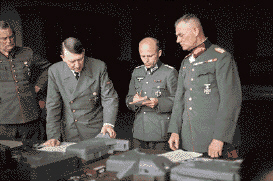 | On November 5, 1937, Hitler met with his
most trusted military advisers for a top-secret briefing. The Third Reich's future, he told
them, depended on solving the need for lebensraum . Where would new living space come from? Not from
overseas colonies, he declared, but from those nations nearest Germany- Austria and Czechoslovakia .
When someone protested that annexing those countries could provoke war, Hitler replied,
"Germany's problems can be solved only by means of force, and this is never without
risk. | | |
|
|
|
1.
|
Why was Hitler willing to risk
war in 1937?
a. | Germany needed a place to imprison
the Jews | c. | Germany needed a
buffer zone to protect against Russia | b. | Germany needed more living space | d. | Germany wanted revenge (lebensraum) against its old enemies from World War
I |
|
|
|
UNION WITH
AUSTRIA
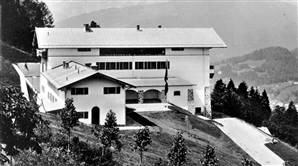 Berchtesgaden - Hitler’s
Villa Berchtesgaden - Hitler’s
Villa |
Hitler invited Austrian chancellor Kurt von Schuschnigg to meet with him at his villa at
Berchtesgaden, high in the Bavarian Alps. Austrian chancellor began making polite conversation
about the view and the lovely day,
For the next few hours, Hitler demanded that Schuschnigg
appoint Austrian Nazis to key government posts . | | |
By the end of the meeting, Hitler had bullied Schuschnigg into signing an
agreement to bring Austrian Nazis into his government. On returning home, Schuschnigg had second
thoughts about the agreement and informed Hitler . Hitler was furious. On March 12, 1938, German
troops marched into Austria unopposed, to cheering Austrian people, forcing Schuschnigg to
resign . Two days later, Germany announced that its Anschluss, or "union," with Austria was
complete . The United States and the rest of the world did nothing.
|
|
|
2.
|
Hitler was able to annex
Austria with ease because most of the Austrian people wanted union with Germany. When Hitler marched
into Austria, what did the rest of the world do to oppose him?
a. | they did
nothing | c. | appealed to the
League of Nations | b. | they protested the action | d. | they threatened Germany with an
embargo |
|
|
|
3.
|
Hitler was born in Austria and
fought in World War I for Germany. We can infer that Hitler considered Austria to
be
a. | a neutral
state | c. | a part of
Germany | b. | an enemy state | d. | a buffer between Serbia and
Germany |
|
|
|
BARGAINING FOR THE SUDETENLAND
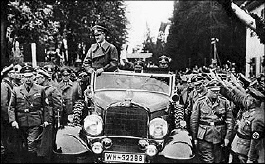
Hitler enters Czechoslovakia | Hitler then turned
to Czechoslovakia . When the Austro-Hungarian Empire was broken up at the end of World War I, the
Sudetenland, a mountainous region inhabited by 3 million German-speaking people, had been joined to
Czechoslovakia . In the spring of 1938, Hitler charged that the Czechs were abusing the Sudeten
Germans, and he began massing troops on the Czech border. The American correspondent William Shirer,
then stationed in Berlin, wrote in his diary: "The Nazi press [is] full of hysterical
headlines. All lies. Some examples : `Women and Children Mowed Down by Czech Armored Cars,' or
`Bloody Regime-New Czech Murders of Germans ."'
| | |
Early in the crisis, both France and Great Britain promised to protect
Czechoslovakia. Then, just when war seemed inevitable, Hitler invited French premier Edouard Daladier
and British prime minister Neville Chamberlain to meet with him in Munich. When they arrived, the
Fuhrer declared that the Sudetenland would be his "last territorial demand." In their eagerness to avoid war, Daladier and
Chamberlain chose to believe him. On September 30, 1938, they signed the Munich Pact,
which turned the Sudetenland over to Germany without a shot being fired.
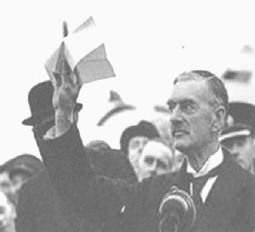
Chamberlain fooled by
Hitler | Chamberlain returned home to wildly cheering crowds . Waving a copy of the
Munich agreement, he proclaimed: "My friends . . . . there has come back from Germany peace with
honor. I believe it is peace in our time." The crowd joyously responded by chanting "Good
old Neville" and singing "For he's a jolly good fellow."
These sentiments
were not shared by Winston Churchill, Chamberlain's political rival for the leadership of Great
Britain. In Churchill's view, by signing the Munich Pact, Daladier and Chamberlain had adopted a
shameful policy of appeasement, or giving up principles to pacify an
aggressor
| | |
As Churchill
bluntly put it, "Britain and France had to choose between war and dishonor. They chose dishonor.
They will have war." Nonetheless, the House of Commons approved Chamberlain's policy toward
Germany by a vote of 366 to 144. Churchill responded with a warning.
|
|
|
4.
|
Why were the Germans upset
about the Sudetenland situation.
a. | former German territory was given to
the country of Czechoslovakia by the Versailles
treaty | c. | the Nazi’s thought all German
speaking people should be part of Germany | b. | the Germans in the Sudetenland
claimed they were being mistreated | d. | all of these are true |
|
|
|
5.
|
What did England and France do
about Hitler’s demands regarding Czechoslovakia?
a. | They told Hitler they would go to
war if he invaded | c. | They asked Hitler
to wait a year before invading | b. | They gave in to Hitler demands. (appeased
him) | d. | They told Hitler the Germans in Czechoslovakia should learn to speak
Czech. |
|
|
|
6.
|
This person has become a symbol
for appeasing dictators because he returned from Germany waving the Munich Agreement signed by Hitler
and claimed, “there will be peace in our time”
a. | Edouard
Daladier | c. | Winston
Churchill | b. | Rudolf Hess | d. | Neville Chamberlain |
|
|
|
7.
|
What was the name of the
agreement signed by Hitler, Daladier of France, and Chamberlain of England that allowed Hitler to
take the Sudetenland from Czechoslovakia?
a. | The white
Paper | c. | The Munich
Pact | b. | The Treaty of Versailles | d. | The Sudetenland Treaty |
|
|
|
8.
|
What did Winston Churchill have
to say about he agreement between Hitler and Chamberlain?
a. | Chamberlain did the right
thing. | c. | England should stay out of European
affairs because it could lead to war | b. | England will have to go to war because Chamberlain did not stand up to
Hitler | d. | Hitler can be trusted but Chamberlain can
not |
|
|
|
German Offensive
Begins
Contrary to his promise at Munich, Hitler was not
finished expanding the Third Reich. As dawn broke on March 15, 1939, German troops poured into
what remained of Czechoslovakia. At nightfall Hitler gloated, "Czechoslovakia has ceased to
exist." After that, the German dictator turned his land-hungry gaze toward Germany's
eastern neighbor, Poland.
The Soviet Union paves the way for Germany to invade
Poland
Like
Czechoslovakia, Poland had a
sizable German-speaking population. In the spring of 1939, Hitler began his familiar routine,
charging that Germans in Poland were mistreated by the Poles and needed his protection. Some people
thought that this time Hitler must be bluffing . After all, an attack on Poland might bring Germany
into conflict with the Soviet Union, Poland's eastern neighbor. At the same time, such an attack
would most likely provoke a declaration of war from France and Britain-both of whom had promised
military aid to Poland . The result would be a two-front war. Fighting on two fronts had exhausted
Germany in World War I. Surely, many thought, Hitler would not be foolish enough to repeat that
mistake.
Hitler took the chance, though, and his luck held. As tensions rose over Poland,
Stalin, despite his deep dislike and distrust of the Nazis, decided he had more to lose than to gain
in a war against Germany. On August 23, 1939, the Soviet Union and Germany signed a nonaggression
pact, in which they agreed not to fight each other. They also signed a second, secret pact,
agreeing to divide Poland between them. With the danger of a two-front war eliminated, the fate of
Poland was sealed. In this way, the Soviet Union allowed Hitler to invade
Poland.
|
|
|
9.
|
Why was Germany afraid of
fighting a two front war in Western and Eastern Europe
a. | Germany was afraid of
Poland | c. | Germany had the bad experience of
fighting a two front war in World War I | b. | Germany had no air force | d. | Germany had never fought a two front war
before |
|
|
|
10.
|
Why did Germany want to invade
Poland?
a. | there were many Germans living in
Poland because the Versailles treaty took territory away from Germany and gave it to
Poland | c. | most of Germany’s
concentration camps were in Poland | b. | Poland was a Jewish country | d. | France and England had a treaty with
Poland |
|
|
|
11.
|
What event made Germany feel
comfortable that it could invade Poland without having to worry about a two front
war?
a. | the non-aggression pact with
Russia | c. | the non-aggression pact with
England | b. | the non-aggression pact with France | d. | the pacifist attitude of the United
States |
|
|
|
12.
|
When Germany invaded Poland
from the west, what did the Soviet Union do?
a. | nothing | c. | sided with the Poles and threatened
Germany | b. | invaded Poland from the east | d. | protested to the League of
Nations |
|
|
|
13.
|
What is a two front
war?
a. | a war in which you are fighting two
different enemies, at different places at the same time | c. | a war that you fight with maps and strategy instead of
troops | b. | a war in which you try to keep your enemies in front of
you | d. | a war that you fight on land and at
sea |
|
|
|
BLITZKRIEG IN
POLAND
As day broke on September 1, 1939, German warplanes roared
over Poland, raining bombs on military bases, airfields, railroads, and cities . At the same time,
German tanks rumbled across the Polish countryside, spreading terror and confusion. This invasion was
the first test of Germany's newest military strategy, the blitzkrieg, or lightning war. The new
tactics enabled the Germans to take the enemy by surprise and then quickly crush all opposition with
overwhelming force . Britain and France declared war on Germany on September 3.
|
|
|
14.
|
What was the new German
military strategy called
a. | lebensraum | c. | tank warfare | b. | blitzkrieg | d. | chemical
warfare |
|
|
|
15.
|
Germany invaded Poland on
September 1, 1939. What did England and France do?
a. | protested to the League of Nations
on September 3 | c. | declared war on
Germany on Sept. 3 1939 | b. | requested a peace conference with Hitler | d. | nothing |
|
|
|
THE PHONY
WAR
For the next few
months, an eerie calm settled over Europe . Bored French and British troops on the Maginot Line, a
system of fortifications along France's eastern border, sat staring into Germany, waiting for
something to happen. Equally bored German troops sitting on the Siegfried Line a few miles away
stared back. The blitzkrieg had given way to what the Germans called the sitzkrieg ("sitting
war"), and the English called the phony war. To fight the tedium, French officer Denis Barlone
made sure that his men were well fed
This deceptive peace was first broken not by Germany but
by the Soviet Union. After occupying eastern Poland, Stalin began annexing other regions that the Soviet Union had lost at the end of
World War I. The Baltic states of Estonia, Latvia, and Lithuania fell with little struggle .
However, Finland-a country that journalist William Shirer admired as "the most decent and
workable little democracy in Europe"-resisted. Late in 1939, Stalin sent his Soviet army into
Finland. After three months of fierce winter fighting, the outnumbered Finns surrendered. Shirer
wrote in his diary, "Stalin reveals himself of the same stamp as Hitler."
On April
7, 1940, a leading German newspaper announced, "Germany is ready. Eighty million pairs of
[German] eyes are turned upon the Fuhrer." Two days later, the rest of the world
stared, unbelieving, as Hitler launched a surprise invasion of Denmark and Norway. Germany
said this action was necessary in order "to protect [those countries] freedom and
independence ." Next, the German blitzkrieg was turned against the Netherlands, Belgium, and
Luxembourg, which were overrun by the end of May. The phony war had suddenly become painfully
real.
|
|
|
16.
|
What did Stalin do after he
invaded Russia?
a. | He took over many of the smaller
countries on the Soviet border | c. | He turned on Hitler and invaded Germany | b. | He made peace with his
neighbors | d. | nothing |
|
|
|
17.
|
What small country held off the
entire Soviet army for three months?
a. | Poland | c. | Lithuania | b. | Latvia | d. | Finland |
|
|
|
18.
|
After taking control of Poland,
what new country did Hitler attack in 1940?
a. | Denmark | c. | Belgium | b. | Norway | d. | all of these |
|
|
|
19.
|
The French thought that the
Maginot Line would protect them from a German invasion such as the invision that happened in World
War I. What was the Maginot Line?
a. | An imaginary line between France and
Germany that France warned Germany not to cross | c. | A series of forts between England, France and
Germany | b. | An earthquake fault between Germany, England and
France | d. | A series of forts and fortifications along the border
between Germany and France |
|
|
|
Britain Fights On While
France Surrenders
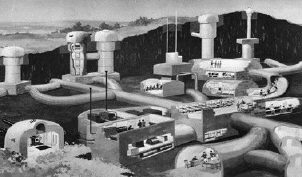
The Maginot
Line | Before the war, France had built the massive fortifications of the Maginot
Line on its border with Germany. With the invasion of Belgium, however, Germany threatened to bypass
the line. French and British troops were sent north into Belgium . Hitler's generals had
anticipated this reaction and sent their tanks slicing through the Ardennes, a region of wooded
ravines in northeast France that the Allies thought was impassable. | | |
THE FALL OF FRANCE
Suddenly, the Allied forces in the north were cut off.
Outnumbered, outgunned, and pounded from the air, they fled to the beaches of Dunkirk, on the English
Channel. In less than a week, a makeshift fleet of fishing trawlers, tugboats, river barges, pleasure
craft, and almost anything else that would float ferried about 340,000 Allied troops to safety across
the Channel.
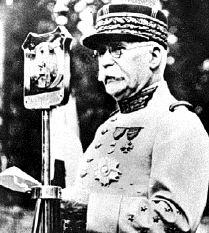
Marshal
Petain |
A few days later, Italy entered the war on the side of Germany and invaded
France from the south as the Germans closed in on Paris from the north. On June 17, 1940, Marshal
Henri Petain, an aged military commander and World War I hero, told his country, "We must stop
fighting." Four days later, at Compiegne, as William Shirer and the rest of the world watched,
Hitler handed French officers his terms of surrender. Germans would occupy the northern part of
France, and a Nazi-controlled puppet government, headed by Marshal Petain, would be set up at Vichy, in southern
France
| | |
After France fell, a French
general named Charles de Gaulle fled to England, where he set up a government-in-exile . De
Gaulle proclaimed defiantly, "France has lost a battle, but France has not lost the
war."
|
|
|
20.
|
France built a long line of
fortifications that it believed would protect it against a German invasion. What was it
called.
a. | the Siegfried
Line | c. | the Normandy Beach
Fortifications | b. | the Maginot Line | d. | the White Cliffs of Dover |
|
|
|
21.
|
The German generals outflanked
the British and French armies and the British found themselves stranded on the beaches of
a. | Norway | c. | Dunkirk | b. | Ardienne | d. | Compiegne |
|
|
|
22.
|
France surrendered to Germany
and the French Vichy government became allies of Germany. Who was head of the Vichy
government?
a. | Marshall
Petain | c. | Winston
Churchill | b. | Charles DeGaulle | d. | Adolf Hitler |
|
|
|
23.
|
Which country joined Germany in
occupying France
a. | Austria | c. | Finland | b. | Italy | d. | Soviet Union |
|
|
|
THE BATTLE OF
BRITAIN
| "The final German victory over England is only a matter of time,"
wrote a German general after the fall of France. In the summer of 1940, the Germans began to assemble
an invasion fleet along the French coast. Because its naval power could not compete with that of
Britain, however, Germany launched an air war at the same time. The Luftwaffe, or German air force,
began making bombing runs over Britain . Its goal was to gain total control of the skies by
destroying Britain's Royal Air Force (RAF) . Hitler had 2,600 planes at his disposal. On a
single day-August 15-1,000 of his planes ranged over Britain . Every night for two solid months, bombers pounded
London. The Battle of Britain raged on through the summer and the fall. Night after night, up to
a thousand German planes pounded British targets . At first the Luftwaffe concentrated on airfields
and aircraft factories. Next it targeted cities . | | |
The RAF fought back brilliantly. With the help of a new technological device
called radar-which accurately plotted the flight paths of German planes, even in darkness-British
pilots unleashed deadly air strikes against the enemy. On September 15, the RAF shot down 56 German
planes. They lost only 26 aircraft . Two days later, the Fuehrer called off the invasion of Britain
indefinitely. "Never in the field of human conflict," said Churchill in praise of the RAF
pilots, `was so much owed by so many to so few."
|
|
|
24.
|
What was the British air force
called.
a. | Luftwaffe | c. | USAF | b. | RAF | d. | Royal
Air |
|
|
|
25.
|
What new technological device
helped the British Air Force to hold off the German Luftwaffe in the
Battle of Britain?
a. | radar | c. | radio | b. | television | d. | code breaking machines |
|
|
|
26.
|
By the end of 1940 all of
Europe and North Africa was controlled by the Axis powers. Only one country stood between Germany and
total domination of the continent. What was it.
a. | Russia | c. | France | b. | England | d. | Norway |
|
|
|
27.
|
What famous city was bombed in
1940 in the Battle of Britain?
a. | Paris | c. | Moscow | b. | Berlin | d. | London |
|
|
|
28.
|
Most historians agree that war
with Germany became inevitable because England and France ________ Hitler and did not stand up to him
when he started invading the countries of Europe..
a. | opposed | c. | appeased | b. | overestimated | d. | liked |
|